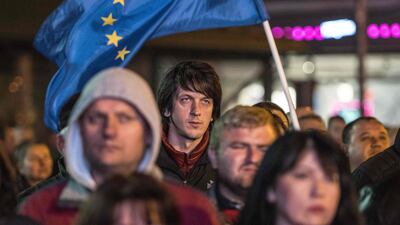The Republic of Macedonia is due to hold its most important vote since 1991, when a referendum for independence sealed its divorce from the federal state of Yugoslavia. Officially, the vote scheduled for September 30 will determine whether the country will change its name to “North Macedonia” and put to rest a decades-long row with neighbouring Greece, whose second-largest region also claims the right to the same name.
In reality, however, the Macedonian referendum is the latest theatre in a tug-of-war between the West and Russia – whose relations have been greatly strained by the crisis in Ukraine, Russia’s annexation of Crimea, military interventions in the Syrian civil war and Russia’s alleged interference in the last US national elections.
The question at the heart of the referendum taps deep into the geopolitical interests of both parties: ‘Do you support EU and NATO membership by accepting the agreement between Macedonia and Greece?’
Accepting the historic EU-brokered agreement reached in June this year – under which Macedonia agrees to the name change in return for Greece ending its opposition to NATO membership – will mean a step towards the European and US orbit, while a vote against it will instead push Macedonia back into the arms of Russia, which sees it as an area of historical linkages.
A survey by the Societas Civilis Institute for Democracy in Skopje on September 10 predicted that over two–thirds will vote in favour of the name deal, with turnout estimated at 58 per cent. A turnout over 50 per cent would make the result legally valid and ensure a smoother ratification by parliament, which is required to give final approval.
This is the desired outcome of Macedonian prime minister Zoran Zaev and his Western allies, who have placed great importance on the vote. “There is no going back from this,” Mr Zaev said. “Each attempt to hinder these processes takes the Republic of Macedonia back to a state of complete uncertainty about its future, a society in which the authoritarian values and instability could be reintroduced.”
But while opinion polls show a convincing majority in favour of the name agreement, Russia’s alleged attempts to suppress voter turnout mean that all bets are off.
“They have transferred money [to groups seeking to defeat the referendum] and they’re also conducting broader influence campaigns,” US Defence Secretary James Mattis said during a visit to Skopje on Monday.
Congress allocated $8 million to Macedonia back in January 2017 to fight Russian disinformation in the run-up to the referendum, the New York Times reported. The money however did not arrive for more than a year and has yet to be effectively deployed.
In the past weeks, Western countries have therefore resorted to sending a flurry of officials to encourage participation, including NATO secretary general Jens Stoltenberg, German chancellor Angela Merkel and EU foreign policy chief Federica Mogherini.
The Macedonian prime minister, who had accused pro-Russian forces of attempting to destabilise the country as protests turned violent in July, avoided pointing the finger at Russia and said his government did not have hard evidence of direct Russian meddling.
The latest attempt at derailing the referendum came Wednesday, when a motion questioning the constitutional legality of the vote was rejected seven to two at Macedonia’s Constitutional Court. The initiative was filed by three separate subjects – namely a far-right non-parliamentary party, a non-formal parliament of the ethnic Macedonians and a private citizen – who called for a boycott of the vote on the grounds the deal with Greece was detrimental to Macedonian national interests.
_______________
Read more:
Jim Mattis condemns Russian influence in Macedonia
Greek police fire teargas at Macedonia protesters
Greece and Macedonia sign deal to end name dispute
_______________
Scores of Facebook posts the US said were generated by Russia had also urged voters to burn their ballots. One widely-shared article falsely claimed that the Macedonian language would no longer be formally recognised if the referendum was successful.
Separate social media posts also revived ethnic tensions by framing the vote as an Albanian vote, rather than a Macedonian one.
While Macedonians are sensitive to the historical and ethnic implications of the vote, “Albanians are less concerned about the identity issue and just want to see their rights recognised,” Danijel Tadic, Senior Policy Analyst at the European Forum for Democracy and Solidarity, told The National.
The minority group, which accounts for approximately 25 per cent of the total population of Macedonia, is hoping the reform process necessary for the country to become an EU member will lead to the recognition of civil rights that Albanians are currently being denied, Mr Tadic said.
Playing up similar sectarian grievances in the Balkans could be all Russia is aiming for, analysts say. A report by the European Council on Foreign Relations found that Russia’s actions in the region, prompted by the EU’s renewed attention to the Western Balkans, aim to “create distractions and potentially bargaining chips with the EU.”
Naim Rashiti, Director of the Balkans Policy Research Group, said economic and political interests – including plans for a gas pipeline passing through Macedonia and other Western Balkan countries – are of secondary importance.
“The priority is preventing Macedonia from joining NATO” he said. Russia does not seek to reassert its authority over the country but instead to harness and magnify existing tensions to gain more leverage.
Simply put, “its goal is to see [the EU and the US] having trouble,” Mr Rashiti said.

